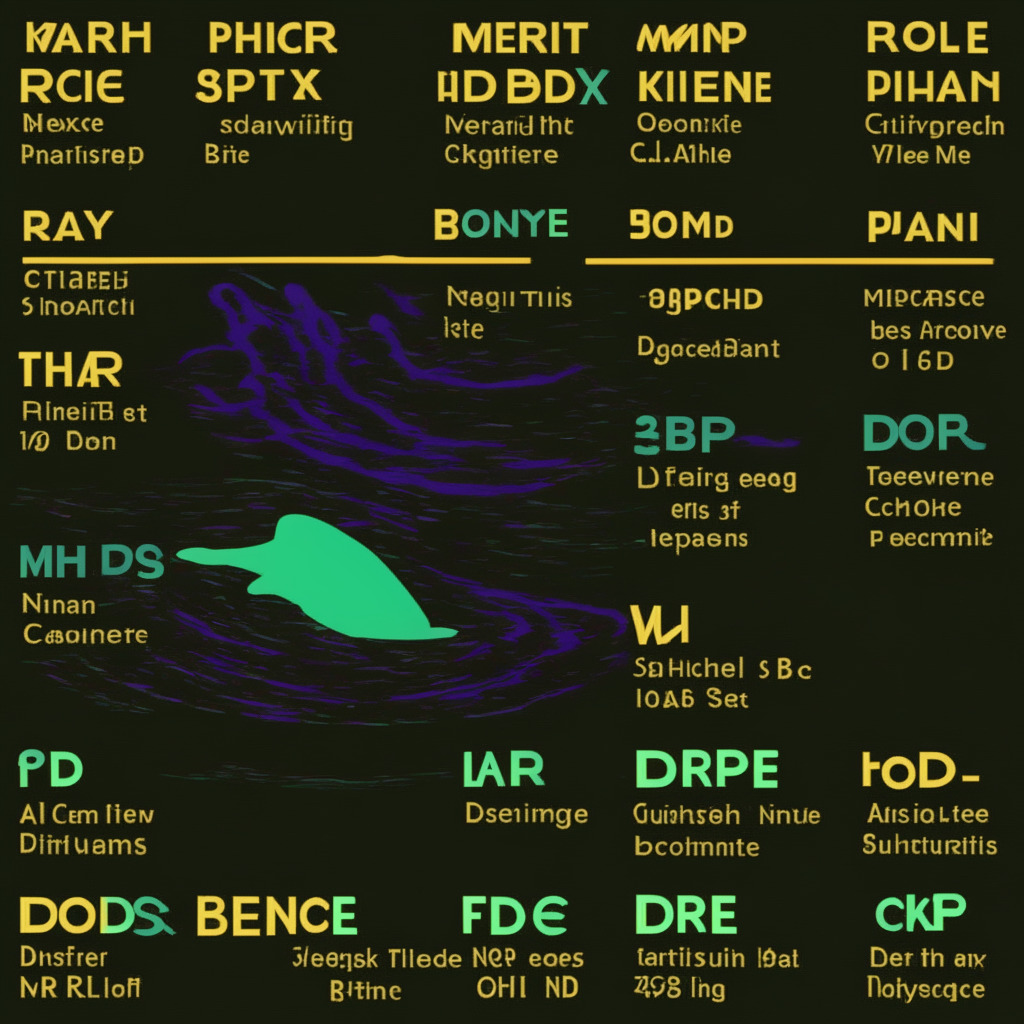Layer-1 blockchain Fuse pledges $10 million for its new initiative, “Fuse Ignite,” aimed at reinvigorating its ecosystem and driving growth. Focusing on DeFi projects, the grants range from $5,000 to $25,000, aiming to boost liquidity and user activity when deploying on the Fuse Network.
Month: May 2023
Fed Rate Hike Impact: Exploring Non-Traditional Crypto Assets Amid Inflation Fears
The cryptocurrency market experiences increased investor interest for non-traditional assets amid potential US Federal Reserve rate hikes. With 80% of chief economists predicting central banks’ difficulties in managing inflation, crypto derivatives exchange BitMEX recommends investing outside the traditional financial system. Cryptocurrencies show varying trends, and investors must thoroughly research and manage risks in these uncertain financial situations.
Coinbase Critic’s Confession Sparks Debate on Offshore Derivatives Exchange Pros & Cons
Coinbase faces opposing pressures from the US Securities and Exchange Commission’s crypto crackdown and user satisfaction as it opens its offshore cryptocurrency derivatives exchange. Despite past missteps, CEO Brian Armstrong has proven trustworthy in handling customer funds. The platform’s future, reputation, and trustworthiness now hinge on its international ambitions and ability to reconcile regulatory and customer concerns.
Bitcoin’s Limitations vs Cardano’s Potential: Blockchain’s Evolution and the Future of Crypto
Charles Hoskinson, founder of Cardano, highlights Bitcoin’s limitations and the potential of programmable money and smart contracts offered by cryptocurrencies like Cardano’s ADA. He suggests blockchain technology can support complex challenges and provide a decentralized, inclusive global system, and emphasizes the importance of adaptability and progress in the fast-paced world of blockchain technology.
Blockchain Future: Revolutionizing Industries or Breeding New Challenges?
The world of blockchain technology offers numerous benefits, such as decentralized finance (DeFi), smart contracts, and non-fungible tokens (NFTs), but also faces challenges like scalability, security, and environmental impact. A balanced and critical perspective is crucial for addressing these concerns and realizing blockchain’s full potential.
UK’s War on Crypto Fraud: Balancing Innovation and Investor Protection
The UK government plans to ban cold calls related to insurance and cryptocurrencies, employing 400 new staff and new anti-spoofing equipment to tackle £7 billion annual fraud costs. The Financial Conduct Authority faces challenges balancing investor protection and nurturing innovation in the crypto industry.
Crypto Advocacy Group’s Move to Washington Amid Regulatory Crackdown: Resilience or Retreat?
The Blockchain Association’s relocation from New York to Washington counters growing regulatory pressure on the crypto industry and highlights the ongoing debate between fostering innovation and ensuring consumer security and market stability.
Flare Integrates Blockchain APIs with Google Cloud Marketplace: Pros, Cons & Centralization Debate
Flare’s integration with Google Cloud Marketplace brings nine blockchain APIs, including Bitcoin and Ethereum, to the ecosystem. This collaboration offers developers and users access to highly-integrated blockchain data, facilitating cross-chain applications and easing blockchain experimentation without hardware costs or ongoing maintenance burdens. However, some express concerns regarding potential centralization issues.
Balancing Blockchain Innovation and Regulation: The Struggle for Crypto’s Future
This article discusses the challenges facing the harmonious relationship between blockchain development and regulation, highlighting two developments: a 110% growth of developers in the crypto space and the decline of American developers due to regulatory uncertainty. The stakes are high as the U.S. must balance innovation and regulation to avoid driving talent elsewhere.
SEC vs. Ripple & DigiToads Presale: Revitalizing Crypto Markets and Investor Confidence
The SEC vs. Ripple case and the DigiToads presale success are crucial events in the crypto market, potentially impacting investor sentiment, regulation, and project adoption. As legal landscapes evolve, investors must remain vigilant and explore quality projects.
Navigating Bitcoin’s Volatility: Key Support and Resistance Levels for Informed Decisions
The crypto market, especially Bitcoin, is witnessing significant volatility due to factors like intensified selling pressure and bearish indications. As the speculative nature of crypto markets continues, buyers and sellers should exercise caution, consider technical support and resistance levels, and conduct thorough due diligence before making investment decisions.
Unlocking Crypto Portfolio Potential: Comparing Market Cap and TVL Weighting Strategies
Digital asset investment management can benefit from traditional finance techniques, such as portfolio construction and regulatory frameworks. Market cap-to-total value locked (MC-TVL) can provide a fundamental analysis of blockchain asset utility, potentially improving overall market exposure and aligning with crypto fundamentals. Investors should explore using fundamentals-based portfolio constructions to assist digital asset management while maintaining objectivity and eyeing future growth.
Pepe Memecoin Boom: Uniswap Success, Challenges, and Sustainability Debate
PEPE memecoin leads the pack with a 2100% price hike since its launch, gaining popularity on decentralized exchange Uniswap. Despite challenges like liquidity issues, PEPE continues to make waves on centralized exchanges. The long-term sustainability and value of meme-oriented cryptocurrencies remain uncertain; investors should approach them with caution.
UK Crypto Ad Regulations: Balancing Innovation and Consumer Protection
UK lawmakers have approved an amendment permitting registered crypto firms to greenlight their advertisements under anti-money laundering guidelines. This aims to protect consumers from deceptive crypto ads, while potentially increasing transparency and consumer protection in the crypto sector. However, the amendment’s effects on growth and innovation remain uncertain.
Polygon’s Upswing and Solana’s Descent: Navigating Crypto Market Uncertainties
Polygon (MATIC) rebounded in today’s trading session, moving closer to the $1.00 mark and showing increased optimism, while Solana (SOL) faced a decline, highlighting the uncertainty within the cryptocurrency market. Stay updated with price analysis to make informed investment decisions.
PepeCoin’s Sharp Correction: Declining Hype, Whale Control, and the Risk of a 20% Drop
The meme-coin Pepe (PEPE) has seen a sharp correction after a 2,000% surge since its debut, with concerns about declining retail interest, whale distribution, and potential price manipulation. Technical indicators suggest a possible further 20% correction, but given the newness of the token and known volatility of meme-coins, accurate predictions are difficult.
AllianceBlock’s NexeraID Joins W3C: Impact on Digital Identity and Decentralized Finance
AllianceBlock’s NexeraID recently joined the World Wide Web Consortium (W3C), working towards standardization of decentralized identifiers and verifiable credentials. This collaboration solidifies NexeraID’s commitment to web standards, empowering users to manage digital identities securely, fostering innovation, and driving advancements in digital ID space.
FBI Seizes Nine Crypto Exchanges: A Crackdown on Ransomware Money Laundering or Stifling Innovation?
The FBI seized nine cryptocurrency exchanges allegedly involved in money laundering connected to ransomware payments, shutting down their servers and seizing domain names. These exchanges facilitated cybercrime activities by offering anonymous services and inadequate anti-money laundering programs, violating US laws. The crackdown sends a warning to other exchanges operating illegally and aims to prevent ransomware-related money laundering.
Bitcoin’s Battle: $30,000 Resistance vs. 50-Day Moving Average – Pros, Cons & Brewing Conflict
Bitcoin’s price consolidates between the 50-day moving average at $28,310 and the $30,000 resistance region, with market direction depending on breakout possibilities. Currently, the RSI indicator denotes equilibrium. Miners’ position index, however, indicates increased selling, creating a conflict between investors and cautious miners.
Pepe Coin Skyrockets: Outpacing Dogecoin and Shiba Inu – A Meme Coin Phenomenon or a Risky Gamble?
Pepe coin (PEPE) has quickly surpassed dogecoin and shiba inu in trading volume, reaching a market cap of $366 million. Factors contributing to PEPE’s success include listings on major crypto exchanges and growing investor interest. However, the inherent risks of meme coin investments demand caution and research.
Banking Crisis: Opportunity for Crypto Growth or Risky Financial Shift?
In the wake of the ongoing banking crisis, key opinion leaders and cryptocurrency founders express satisfaction at the decline of traditional banking systems, hinting at the potential rise of cryptocurrencies. However, it’s crucial to acknowledge the ongoing challenges and risks associated with digital currencies and maintain a balance between innovation and caution.
Fed Interest Rate Decision Looms: Bitcoin’s Vulnerability and an Unfolding Banking Crisis
Amid the Federal Reserve’s anticipated interest rate hike and an ongoing banking crisis, Bitcoin’s price remains vulnerable and uncertain. Decreasing market volume and Bitcoin’s indifference to financial turmoil challenge investors to adapt their strategies to navigate this unclear future.
Celsius Network Debacle: The Fight for Justice, Transparency, and Asset Recovery in Crypto
Newly filed documents reveal Celsius Network’s alleged attempt to merge its fraudulent UK and US operations, sparking concerns for investors. The case highlights the need for transparency and regulatory oversight in the rapidly evolving, yet largely unregulated, crypto market.
BNB Chain Reigns Supreme in User Activity: Solana and Ethereum Trail Behind
BNB Chain leads in user activity with 10.9 million active wallet addresses in April, outperforming Solana and Ethereum. Despite an 11% dip in activity, key players like Polyhedra, LayerZero, and Stargate Finance contribute to its dominance. However, Binance USD faces regulatory challenges and a decline in traffic, highlighting the crypto ecosystem’s volatility.
Balaji’s Canceled $1M Bitcoin Bet: Shaky Predictions or Crypto Resilience Highlighted?
Former Coinbase CTO Balaji Srinivasan has cancelled his $1 million bet on Bitcoin reaching $1 million within 90 days, sparking skepticism about cryptocurrency market viability and stability. However, supporters argue the bet’s cancellation highlights the rapidly changing financial landscape and increasing importance of cryptocurrencies amid concerns over fiat currency inflation.
DeFi Surge & FTX Collapse: CBDCs, Tokenized Deposits, & Stablecoins Battle for Dominance
Decentralized finance (DeFi) explores viable alternatives such as central bank digital currencies (CBDCs), tokenized deposits, and fiat-backed stablecoins, each with unique advantages and drawbacks. Their coexistence and success in the DeFi landscape will depend on catering to customer needs and ensuring trust in payment transaction redemptions.
NFT Ticketing Revolution: Ozaru’s Innovative Blockchain-based System for Events
Dubai-based web3 company, Ozaru, rebrands from Oaziz and introduces an innovative NFT ticketing product for event management launching on May 16th, 2023. The decentralized system aims to provide a more secure and seamless experience for event organizers and attendees while raising concerns about accessibility for users unfamiliar with digital assets.
COLT vs ATOM vs SHIB Showdown: Analyzing ROI and Risk in the Crypto Market
Collateral Network’s innovative decentralized lending protocol aims to revolutionize the trillion-dollar asset-backed lending market, with the COLT token forecasted to deliver a 3500% ROI. Offering high gains, backed by reliable team and growing community, it warrants attention in the crypto market.
Trust Wallet Security Analysis: AX1 Research Highlights Strengths and Room for Improvement
AX1 Company’s research on Trust Wallet reveals its strong encryption, multi-factor authentication, and timely security updates. However, AX1 suggests improvements in transparency, user education, and a comprehensive security policy for enhanced user confidence and security.
Legal Battle: NY Attorney General vs. Celsius Network Founder – Unveiling the Crypto Risks
The New York State Attorney General filed a complaint against Celsius Network founder Alex Mashinsky, accusing him of defrauding investors and concealing the platform’s failing health. The legal battle highlights the importance of understanding crypto investment risks, regulatory challenges, and the necessity for regulatory bodies to adapt to the industry’s unique challenges.
Balancing Anonymity & Compliance: Crypto’s Struggle with KYC/AML Regulations and Decentralization
The crypto sector faces the challenge of balancing anonymity and compliance with U.S. regulators demanding adherence to KYC and AML regulations. Blockchain’s future may lean towards AML/KYC compliance to attract institutional investors, while some decentralized protocols may resist due to privacy ideals. The balance between anonymity and compliance is crucial for the crypto sector’s growth and success.
NEAR Protocol and Shemaroo Entertainment: Web3’s Impact on Indian Media Market
NEAR Protocol partners with Shemaroo Entertainment to promote Web3 adoption in the Indian media and entertainment market, focusing on building decentralized applications and exploring non-fungible token opportunities. Challenges such as public understanding, regulatory frameworks, and adoption obstacles are also considered.































